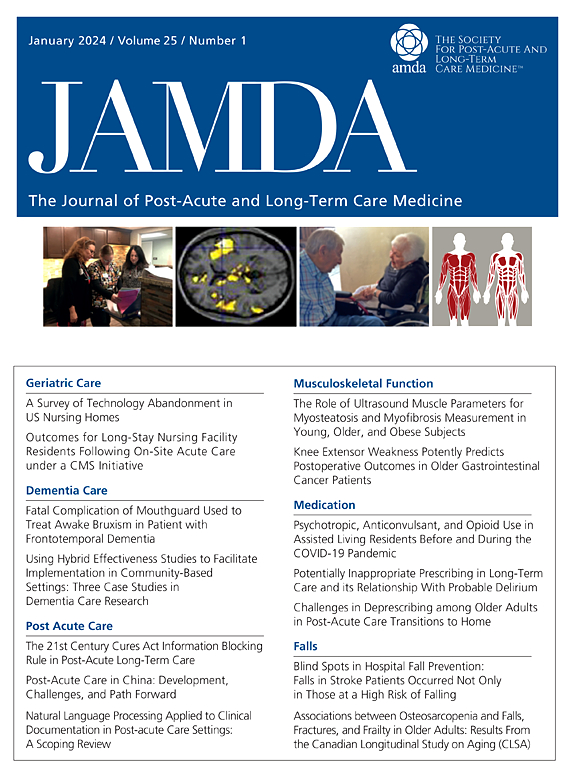Associations of Regular Internet Usage with All-Cause and Cause-Specific Mortality: A Prospective Cohort Study
IF 4.2
2区 医学
Q2 GERIATRICS & GERONTOLOGY
Journal of the American Medical Directors Association
Pub Date : 2024-10-11
DOI:10.1016/j.jamda.2024.105301
引用次数: 0
Abstract
Objectives
The impact of internet usage on mortality is not widely known. This study intended to investigate the associations between regular internet usage and the risks of all-cause and cause-specific mortality, while also ascertaining potential factors that may modify these correlations.
Design
A community-based prospective cohort study.
Setting and Participants
The study included 21,481 individuals [mean (SD) age, 64.1 (11.0) years] from the Health and Retirement Study, with data collected between 2006 and 2020.
Methods
The Cox proportional hazards regression model was used to evaluate the associations between regular internet usage and the risks of all-cause and cause-specific mortality, adjusting for demographic factors, lifestyle behaviors, and other potential confounding factors. Moreover, we explored the association between daily hours of internet usage and the risk of outcomes.
Results
Regular internet usage was significantly associated with a lower risk of all-cause mortality (hazard ratio, 0.78; 95% CI, 0.74-0.83) and cardiovascular mortality (hazard ratio, 0.72; 95% CI, 0.64-0.82). No significant interaction effects were observed for age, sex, regular exercise, or current alcohol consumption (all P interactions > .05). Additionally, estimations for daily hours of usage indicated a U-shaped relationship with all-cause mortality. Adults who used 2.1 to 4 hours per day had the lowest risk; however, not all estimations showed their significance on account of the limited sample size.
Conclusions and Implications
Regular internet usage was associated with a lower risk of all-cause and cardiovascular mortality, which may prompt consideration of the beneficial impact of internet usage on lifespan.
经常上网与全因和特定原因死亡率的关系:一项前瞻性队列研究
目的:互联网使用对死亡率的影响尚未广为人知。本研究旨在调查经常使用互联网与全因和特定原因死亡风险之间的关联,同时确定可能改变这些关联的潜在因素:设计:一项基于社区的前瞻性队列研究:研究纳入了健康与退休研究中的 21,481 人(平均 [SD] 年龄,64.1 [11.0] 岁),数据收集时间为 2006 年至 2020 年:在调整了人口统计学因素、生活方式行为和其他潜在混杂因素后,我们使用 Cox 比例危险回归模型评估了定期使用互联网与全因和特定原因死亡风险之间的关系。此外,我们还探讨了每天使用互联网的时数与结果风险之间的关联:结果:经常使用互联网与较低的全因死亡风险(危险比为 0.78;95% CI,0.74-0.83)和心血管死亡风险(危险比为 0.72;95% CI,0.64-0.82)明显相关。在年龄、性别、经常锻炼或目前饮酒量方面没有观察到明显的交互作用(所有交互作用的 P 均大于 0.05)。此外,对每日使用时数的估计表明,使用时数与全因死亡率呈 U 型关系。每天使用 2.1 到 4 小时的成年人风险最低;然而,由于样本量有限,并非所有估计值都具有显著性:经常使用互联网与较低的全因和心血管死亡风险有关,这可能会促使人们考虑使用互联网对寿命的有益影响。
本文章由计算机程序翻译,如有差异,请以英文原文为准。
求助全文
约1分钟内获得全文
求助全文
来源期刊
CiteScore
11.10
自引率
6.60%
发文量
472
审稿时长
44 days
期刊介绍:
JAMDA, the official journal of AMDA - The Society for Post-Acute and Long-Term Care Medicine, is a leading peer-reviewed publication that offers practical information and research geared towards healthcare professionals in the post-acute and long-term care fields. It is also a valuable resource for policy-makers, organizational leaders, educators, and advocates.
The journal provides essential information for various healthcare professionals such as medical directors, attending physicians, nurses, consultant pharmacists, geriatric psychiatrists, nurse practitioners, physician assistants, physical and occupational therapists, social workers, and others involved in providing, overseeing, and promoting quality

 求助内容:
求助内容: 应助结果提醒方式:
应助结果提醒方式:


